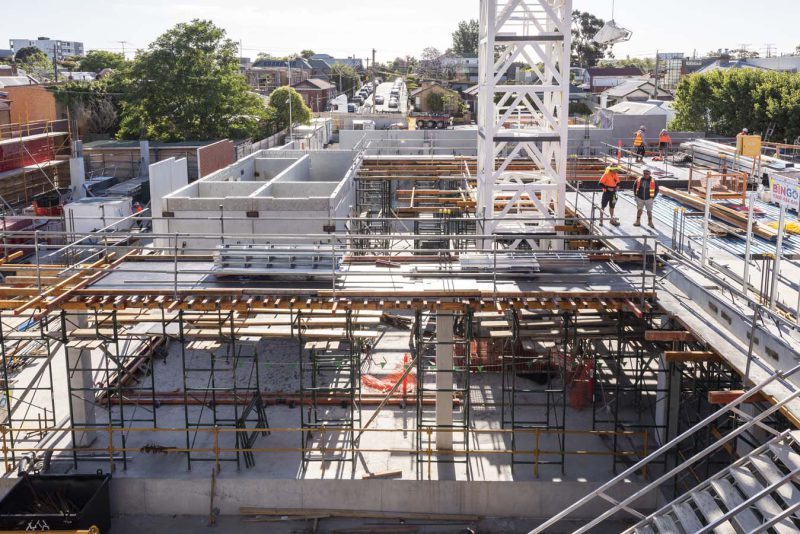Formwork Inspections: Identifying and Addressing Common Formwork Defects
30 April 2024
Guarantee solid structural integrity with formwork inspections by Omniform. A formwork inspector identifies and rectifies common formwork support defects to ensure safer and flawless suspended slab, wall or column concrete pours.
Formwork failure during construction can be extremely catastrophic. Incorrectly erected or poorly erected formwork can lead to structural failures, delays, and costly rework.
Getting a pre-pour inspection by a qualified person eliminates this risk. A single element can be the cause of a formwork collapse which is why it is imperative to have a professional review your formwork and give you full confidence in your erected structure.
Primary Causes of Formwork Defects
Common formwork defects can include misalignment, improper bracing, inadequate support and spacing inaccuracies. These defects affect the stability of the formwork system and can also affect the quality and finish of concrete elements.
Inadequate design specifications and/or improper planning can lead to formwork defects. This includes insufficient consideration of loads, inadequate bracing, or improper formwork layout. The use of low-quality or unsuitable materials for formwork construction can also result in defects. Other causes of formwork defects include improper formwork installation, overloading, lack of material maintenance, inadequate supervision and training, and poor workmanship.
Identifying and rectifying formwork defects is crucial to prevent costly rework, delays, and potential failures.
The Essence of Formwork Inspection
Engaging a qualified and experienced formwork inspector who can identify any issues and assist in any required rectification prior to commencing a pour will ensure you that your concrete pour will proceed with ease and safety.
Onsite formwork inspections must be conducted by an external engineer in order to avoid any undue influence thus ensuring true compliance and pour safety.
Formwork inspections can be conducted prior to pour by Omniform as we possess qualified personnel with expertise in formwork design and erection. Our inspections cover various aspects of formwork including loading, alignment, stability, bracing, supports, joint tightness and critical spacings/dimensions. We perform on the spot calculations to ensure you get immediate direction to enable your building cycle to not be delayed. We additionally refer to the relevant standards, codes of practice, and manufacturer guidelines to ensure compliance and quality assurance.
Once we identify any formwork issues or defects we directly guide you with how to rectify them in order to prevent any further issues or delays. Omniform believes that prompt and clear coordination and communication between formworker and formwork inspector is essential in order to implement effective solutions and minimise disruptions to the construction schedule.
When we are satisfied with the structural integrity of your erected formwork we provide you with formal certification documentation. Our aim is to leave you with full confidence in your erected formwork/structure with our safety guarantee.
Quality Assurance in Formwork
Quality assurance is important in formwork construction to ensure that defects are prevented or promptly rectified to maintain the structural integrity and safety of the project.
Quality assurance measures for formwork may include strong pre-construction planning, correct formwork material selection, ongoing training and monitoring of the erecting personnel, adherence to relevant standards, attaining and understanding formwork designs and, of course, inspection by a third-party engineer. By implementing these protocols, construction teams can mitigate risks, improve productivity, and deliver high-quality concrete structures with full confidence.
Formwork inspections by Omniform can ensure the structural integrity, safety and quality of construction projects. By identifying and addressing common formwork defects early in the construction process, we can easily mitigate risks, prevent costly rework and guide you in delivering successful concrete pours.

